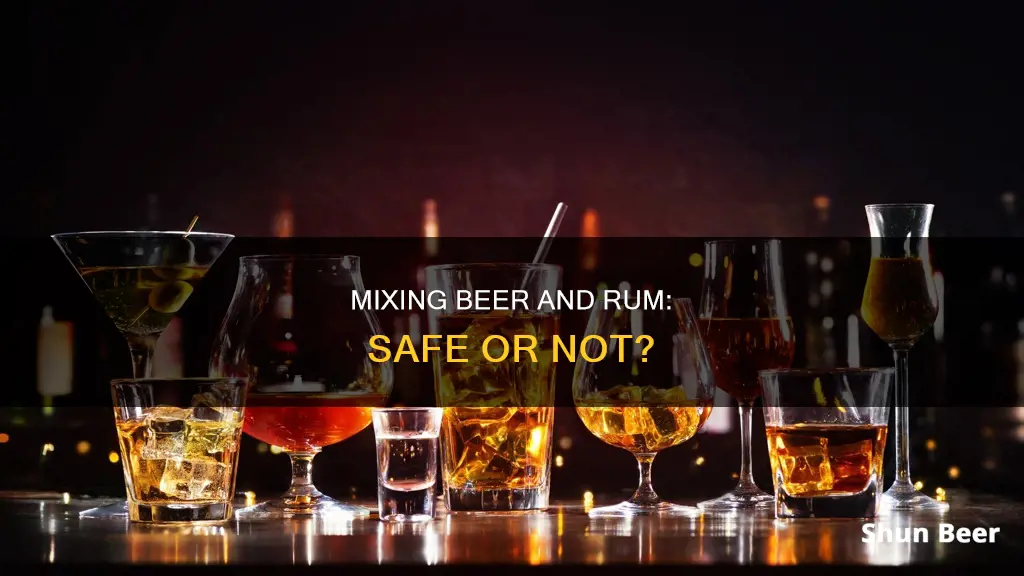
Drinking beer after rum is unlikely to make you feel any better or worse than drinking them in the opposite order. The popular saying, beer before liquor, never been sicker; liquor before beer, you're in the clear, suggests that drinking beer after liquor will make you sick. However, this is just a myth, and the order of your drinks has little to do with how sick you'll feel. What matters more is the total amount of alcohol consumed and other factors such as whether you ate before drinking, how frequently you drink, genetics, and congeners (compounds found in alcoholic beverages that can contribute to hangovers). So, whether you're drinking rum, beer, or both, the key to avoiding a hangover is moderation and knowing your limits.
| Characteristics | Values |
|---|---|
| Can drinking beer after rum make you sick? | No, it's not what you drink but how much you drink that makes you sick. |
| Can drinking beer after rum increase the severity of a hangover? | No, the order of drinks does not influence the severity of a hangover. |
| What are the factors that influence the risk of a hangover? | The amount of alcohol consumed, whether you ate, how frequently you drink, genetics, congeners, and smoking. |
What You'll Learn

The order of drinks does not affect a hangover
There is a common misconception that drinking beer after rum or vice versa can worsen a hangover or cause sickness. This is encapsulated in the saying, "beer before liquor, never been sicker; liquor before beer, you're in the clear." However, this is just a myth, and the order of drinks does not affect a hangover.
The saying may have originated from the observation that people tend to start their evenings with lower-alcohol drinks like beer and wine and progress to liquor later in the night. If they get sick or experience a hangover the next day, they may attribute it to the order in which they consumed their drinks. Another theory suggests that starting with liquor and ending with beer may slow subsequent spikes in blood alcohol levels, potentially reducing hangover severity.
However, the order of drinks is unlikely to influence a hangover. Alcohol is absorbed into the bloodstream as soon as it reaches the stomach, and by the time a hangover sets in, all the alcohol consumed has already been absorbed. As long as the total amount of alcohol consumed remains the same, the order of drinks does not impact the likelihood or severity of a hangover.
The severity of a hangover is influenced by various factors, including the total amount of alcohol consumed, whether one drank on an empty stomach, how frequently one engages in heavy drinking, genetics, and the presence of congeners in alcoholic beverages. Congeners are compounds produced during fermentation that contribute to the taste and smell of drinks. Darker spirits, such as bourbon, tend to have higher levels of congeners and may worsen hangover symptoms. Clear or lighter-colored drinks, like vodka, gin, and rum, have lower congener levels.
While the order of drinks does not affect a hangover, it is important to remember that drinking in moderation or abstaining completely is the best way to prevent a hangover. Additionally, staying hydrated, getting adequate sleep, and eating a nutritious meal can help alleviate hangover symptoms.
Beer Drinking in Oklahoma: Sunday's Special Rule
You may want to see also

Drinking pace matters more than drinking order
There is a popular saying, "Beer before liquor, never been sicker; liquor before beer, you're in the clear." This implies that drinking beer after rum will make you sick. However, this is just a myth, and there is no scientific evidence to support this claim. The order of drinks does not matter as much as people think. What matters more is the pace at which you are drinking and the total amount of alcohol consumed.
The idea that drinking beer after liquor will make you sicker is based on the notion that liquor has a higher alcohol content and will spike your blood alcohol levels more quickly. However, this theory does not consider the role of drinking pace and total alcohol consumption. Whether you start with beer or liquor, if you drink slowly and in moderation, you are less likely to experience negative effects. On the other hand, if you drink quickly and excessively, you are more likely to experience intoxication and other adverse effects, regardless of the order of drinks.
Research has shown that drinking pace, or the number of drinks consumed per hour, increases throughout the evening for frequent drinkers. This acceleration in drinking pace is more common in certain drinking cultures, such as in the Netherlands, where binge drinking is prevalent. Men tend to start with a higher number of drinks, but both men and women show a similar pattern of increasing their drinking pace as the evening progresses. This acceleration in drinking pace is even more pronounced among high-risk or harmful drinkers.
The faster you consume drinks, the quicker your Blood Alcohol Concentration (BAC) will rise. The liver can only metabolize a certain amount of alcohol per hour, and when the rate of consumption exceeds the rate of detoxification, your BAC will continue to rise, leading to higher levels of intoxication. Additionally, drinking on an empty stomach can also increase the rate of absorption and spike your BAC more quickly. Eating before drinking, especially foods high in protein, can help slow down the absorption of alcohol and delay the peak BAC.
In conclusion, while the order of drinks may have some influence, it is the drinking pace and total amount of alcohol consumed that are the key factors in determining the effects on your body. To reduce the risk of negative consequences, it is important to drink in moderation, maintain a slow and steady pace, and avoid excessive consumption.
Parked, Drinking Beer: Legal or Not?
You may want to see also

Carbonated drinks irritate the stomach lining
There is no specific order in which one should consume beer and rum to avoid a hangover. The popular saying, "Beer before liquor, never been sicker; liquor before beer, you're in the clear," is not supported by scientific evidence. The severity of a hangover depends on various factors, including the amount of alcohol consumed, whether consumed on an empty stomach, frequency of drinking, genetics, congeners, and smoking status.
Carbonated drinks, including beer, can irritate the stomach lining and cause digestive issues. Here are some reasons why carbonated drinks can irritate the stomach lining:
- Introduction of Gas: Carbonated drinks introduce carbon dioxide gas into the stomach, leading to increased gastric volume. This can result in bloating, nausea, and a feeling of fullness. The gas can also cause stomach pain and discomfort, especially for those sensitive to carbonation.
- Irritating Additives: Carbonated beverages often contain added sugars, caffeine, and artificial sweeteners, which can have negative health effects. Caffeine can irritate the stomach and exacerbate conditions like irritable bowel syndrome (IBS). Artificial sweeteners can have a laxative effect, leading to diarrhea.
- Alteration of Stomach Acid: Carbonated drinks can slightly alter pH levels in the body and increase pressure in the stomach and intestines. While research has not consistently linked carbonation to acid reflux, the altered pH and increased pressure may contribute to digestive issues.
- Aggravation of Digestive Conditions: While carbonated drinks are not known to cause chronic digestive conditions like IBS or gastroesophageal reflux disease (GERD), they can aggravate existing conditions. The carbonation and acidity may trigger symptoms in individuals with GERD, and the bloating and gas may cause flare-ups in those with IBS.
Beer and Medication: Safe or Not?
You may want to see also

Alcohol is absorbed as soon as it reaches the stomach
The popular saying, "beer before liquor, never been sicker; liquor before beer, you're in the clear," is based on the idea that the order in which you consume your drinks will influence whether you experience a hangover the next day. Many people believe that drinking beer after rum or liquor will make them sick. However, this notion is purely based on subjective experiences and has no scientific basis.
The rate of alcohol absorption depends on several factors. Alcohol is absorbed more quickly when consumed on an empty stomach, and the concentration of alcohol is higher, such as with liquor. Food in the stomach can slow down the absorption of alcohol by physically obstructing its contact with the stomach lining. Carbohydrates, in particular, retard absorption, with blood alcohol concentrations reaching only a quarter of those achieved on an empty stomach.
The amount of alcohol consumed, the speed of consumption, and the presence of food in the stomach are all factors that influence the rate of intoxication. The liver, which is responsible for detoxifying the body from alcohol, metabolizes alcohol at a constant rate of about one drink per hour. This rate cannot be accelerated, and excessive alcohol in the blood can lead to intoxication.
In conclusion, while drinking beer after rum may not increase the likelihood of a hangover, it is important to consider other factors that can affect your risk of experiencing one. These factors include the total amount of alcohol consumed, the speed of consumption, the presence of food in the stomach, and individual factors such as body composition and genetics.
Beer and Acetaminophen: A Safe Mix?
You may want to see also

Drinking on an empty stomach is unwise
The risks of drinking on an empty stomach are well documented. Firstly, it can lead to faster intoxication. This means that you may experience loss of coordination, reduced responsiveness, and inability to speak coherently more quickly than if you had eaten. Drinking on an empty stomach can also lead to tachycardia (rapid heartbeat) and risky sexual behaviors. These are all symptoms of alcohol poisoning, which can be life-threatening.
Additionally, drinking on an empty stomach can cause unpleasant and toxic side effects. It can lead to gastritis and other stomach problems, often related to excess stomach acid. The high alcohol content of liquor can spike your blood alcohol levels in a short period, especially if consumed on an empty stomach. This can contribute to a hangover, with symptoms such as dizziness, inability to concentrate, mood issues, and sensitivity to light and sound.
Even light to moderate drinking on an empty stomach can be dangerous. Alcohol affects your ability to think and coordinate your body movements. If you drink too much, you may experience an inability to think clearly or move your body safely, which can lead to injury or even death. Therefore, it is always advisable to eat before drinking, preferably at least an hour beforehand. This will slow down the absorption of alcohol and reduce the risk of negative consequences.
Beer for Slugs: Does It Work?
You may want to see also
Frequently asked questions
Yes, you can drink beer after drinking rum. However, it is important to remember that drinking too much alcohol, regardless of the type or order of consumption, can lead to negative consequences such as hangovers and vomiting.
The order of drinking beer and rum does not affect the severity of a hangover. The amount of alcohol consumed and individual factors such as genetics, hydration, and food intake play a more significant role in determining the likelihood and intensity of a hangover.
There is no significant benefit to drinking beer after rum or vice versa in terms of hangover prevention. However, starting with a drink that has a lower alcohol content, such as beer, can help slow the increase in alcohol levels in your body. This is because drinks with higher alcohol content, like rum, can more quickly spike your blood alcohol levels.







